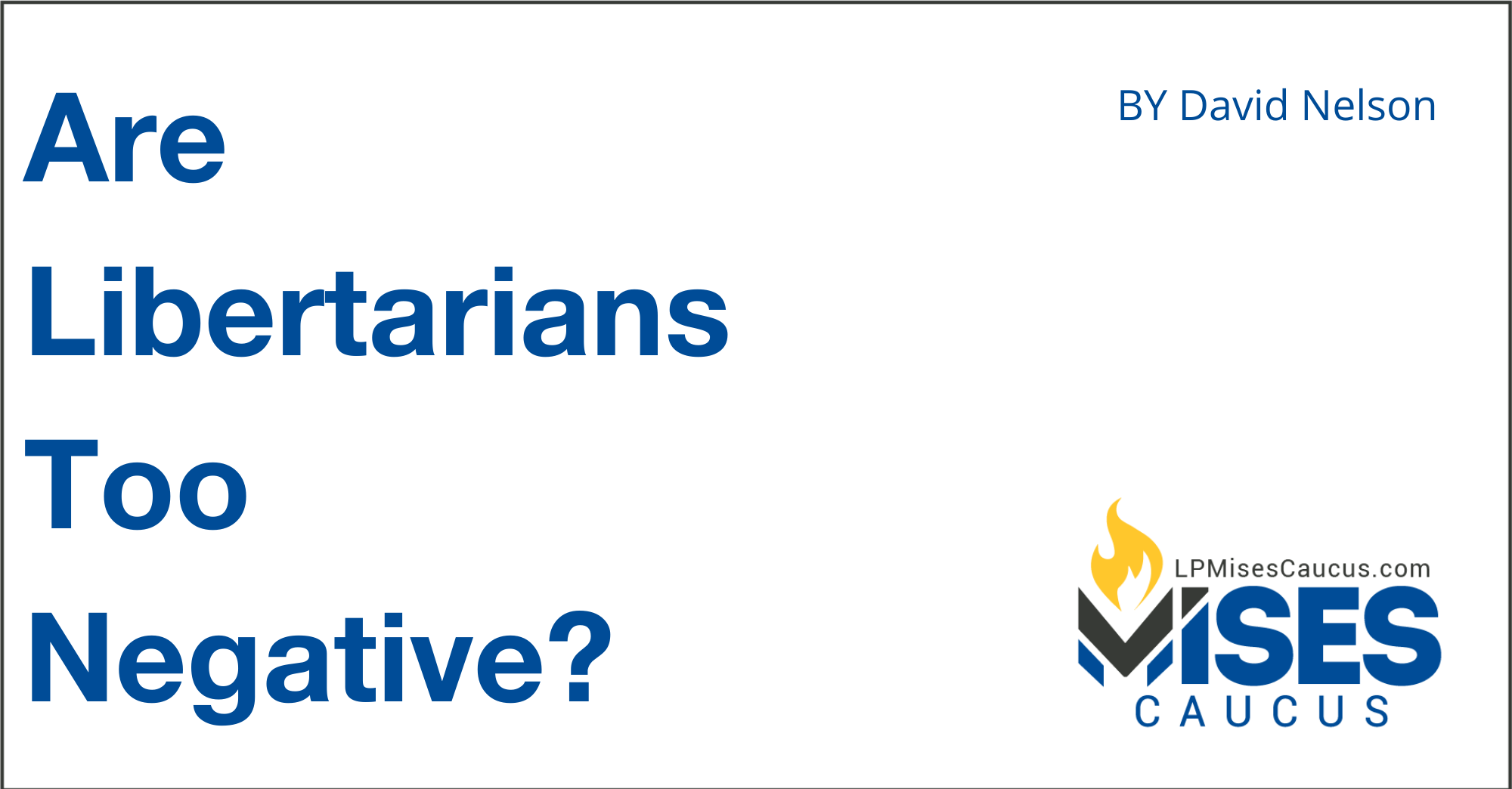Libertarians hate everything. We hate all the presidents: Biden, Trump, Obama, George W. Bush, Clinton, they’re all the worst. We hate all of the largest, most important institutions. The CIA, the FBI, the IRS, the Federal Reserve, Congress, the Department of Agriculture. They’re all awful. We oppose every new government policy and every proposed expansion of an existing one. New wars, taxes, welfare programs, regulations, bailouts. We oppose them all. We really don’t think government should be doing much of anything at all, and when they do, we rant and rave about all the bad things that will happen as a result. Maybe the only reasonable conclusion one should make about libertarians is that we are horribly negative people, who just like to sit around all day and complain while offering nothing of any positive value.
But let’s compare the libertarian worldview to that of a statist, one who reveres politicians, respects the authority of our major government institutions, and believes in the state as the key entity to promoting general societal goodness. These people, in fact, have a far more depressing view of the world and of humanity than a libertarian. A statist believes that humans are inherently fragile, incompetent, and maleficent beings. The severe flaws in humanity are the primary justification for everything a statist advocates. People are stupid, which is why we need wise political leaders to create rules to direct them how to live. People are self-destructive, which is why we need state policy to prevent them from doing things that will destroy their lives. People are evil, which is why government is needed to force them to be good. A statist generally believes that without the state and without a select few wise and benevolent leaders, who don’t suffer from all the defects the rest of us do, humanity would devolve into some form of chaos and barbarism.
A libertarian, on the other hand, believes in the general ability of humans to cooperate on a voluntary basis to produce extraordinary good. The free market, a system where humans are left to their own devices to communicate, trade, and interact with one another as they choose, has produced more prosperity, progress, and human flourishing than the state could ever dream of. Free people, acting on their own will, have also proven to be far more giving, charitable, and inclined to help their fellow man in need than those acting under state compulsion. Libertarians oppose state intervention in its many forms, based not on a pessimistic view of the world or of humanity, but on an optimistic view of our ability to improve our own lives and the lives of those around us when we are not interfered with or obstructed by the state. This is not to say that we view humans as perfect or unflawed. Certainly, there are limits to human capability and aspects of human nature that can easily lead to suffering and chaos. However, the optimal condition for humans to thrive under is freedom for all, not rule and coercion by a select few over all others, which only accentuates our inherent flaws.
Let’s compare the worldview of a statist compared to a libertarian on an issue like war. The statist is generally inclined to support wars or other overseas interventions, as long as they don’t happen to personally dislike the politician currently in charge who is carrying out the policy. The libertarian, on the other hand, opposes war and violent foreign intervention universally. The libertarian will often be accused of espousing negativity or pessimism. You don’t think the people of X country deserve our help, or, you don’t support our troops and our leaders and our flag, are a few common retorts we will hear from war advocates when we oppose the next proposed foreign boondoggle. Another common sentiment towards anti-war libertarians is: all you do is complain all day about the policies we suggest, why don’t you stop being so negative and come up with a solution. The libertarian is seen as a pessimist because he opposes the government policy, knowing it will only lead to harm. Meanwhile, the statist who advocates the war is seen as a cheerful crusader, ready to solve all the world’s problems with his bright ideas and positive outlook.
But the libertarian in fact has a much more positive outlook because he realizes the world can survive and thrive without George Bush or Barack Obama’s bombs. He does not advocate wild policies like attempting to starve the people of a foreign country so they will overthrow a dictator who we don’t like, as was done in Iraq in the 1990s, or arming al-Qaeda linked fighters in Syria so they can wage a proxy civil war for us. Instead, the libertarian solution advocates for peaceful relations with other nations and for promoting freedom by way of example, not force. Alternatively, the statist does not believe in the ability of the people of the world to thrive without the intervention of our politicians, who they see as superhuman and above the shortcomings of the rest of us. Instead, they view the regular people of the world as incompetent and completely dependent on the paternal wisdom, guidance, and ultimately, force, of the state.
It is important to distinguish between reverence for the state and all of its agents and institutions and positivity for humanity and the world. While those who believe in government involvement in all areas of life have very favorable views of state agencies and programs, as well as politicians and their close allies in the mainstream press, academia, and corporate America, they often have utter contempt and disdain for ordinary people. The primary reason they are willing to delegate so much power and authority to government is because they simply do not believe in the ability of humans to function on their own without the forceful hand of the state ensuring that they do as they’re told. Libertarians, while adamant about our disdain for the state and its propensity to destroy any area of society that it touches, are incredibly bullish about the ability of people to advance society in a positive manner when they are untethered by government intrusion. While we don’t advocate for government-based solutions to the problems we see in the world, we are confident in the solutions that can be achieved by free people and optimistic about humanity outside of the state.

